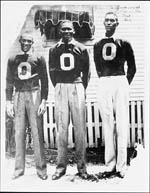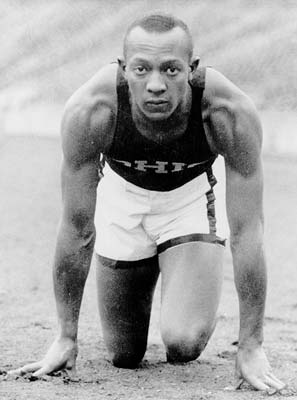



|
BEST ATHLETE OF THE OLYMPIC HISTORY
By jesseowens.com
James Cleveland Owens was born in 1913 in a small town in
Alabama to Henry and Emma Owens. When J.C. was eight, his parents decided to move the
family to Cleveland, Ohio. They did not have much money, and J.C.'s father was hoping to
find a better job. When they arrived in Cleveland, J.C. was enrolled in a public school.
On his first day of class when the teacher asked his name, she heard Jesse, instead of
J.C. He would be called Jesse from that point on.
 |
| Owens (left) in
the Ohio State Athletics Team... |
Cleveland was not as prosperous as Henry and Emma had hoped
and the family remained very poor. Jesse took on different jobs in his spare time. He
delivered groceries, loaded freight cars and worked in a shoe repair shop. It was during
this time that Jesse discovered he enjoyed running, which would prove to be the turning
point in his life.
One day in gym class, the students were timed in the 60-yard dash. When Coach Charlie
Riley saw the raw, yet natural talent that young Jesse had, he immediately invited him to
run for the track team. Although Jesse was unable to participate in after-school practices
because of work, Coach Riley offered to train him in the mornings. Jesse agreed.
At Cleveland East Technical High School Jesse became a track star. As a senior, he tied
the world record in the 100-yard dash with a time of 9.4 seconds, only to tie it again
while running in the Interscholastic Championships in Chicago. While in Chicago, he also
leaped a distance of 24 feet 9 5/8 inches in the broad-jump.
Many colleges and universities tried to recruit Jesse; he
chose to attend Ohio State University. Here Jesse met some of his fiercest competition,
and not just on the track. The United States was still struggling to desegregate in 1933,
which led to many difficult experiences for Jesse. He was required to live off campus with
other African-American athletes. When he traveled with the team, Jesse could either order
carryout or eat at "blacks-only" restaurants. Likewise, he slept in
"blacks-only" hotels. On occasion, a "white" hotel would allow the
black athletes to stay, but they had to use the back door, and the stairs instead of the
elevator. Because Jesse was not awarded a scholarship from the university, he continued to
work part-time jobs to pay for school.
 |
| He won the four
gold medal in the Nazi Olympics |
At the Big Ten meet in Ann Arbor on May 25, 1935, Jesse set
three world records and tied a fourth, all in a span of about 45 minutes! Jesse had an
ailing back the entire week leading up to the meet in Ann Arbor. He had fallen down a
flight of stairs, and it was questionable whether he would physically be able to
participate in the meet. He received treatment right up to race time. Confident that the
treatment helped, Jesse persuaded the coach to allow him to run the 100-yard dash.
Remarkably, each race timer had clocked him at an official 9.4 seconds, once again tying
the world record. This convinced Owens' coach to allow him to participate in his other
events. A mere fifteen minutes later, Jesse took his first attempt it the broad jump.
Prior to jumping, Jesse put a handkerchief at 26 feet 2½ inches, the distance of the
world record. After such a bold gesture, he soared to a distance of 26 feet 8¼ inches,
shattering the old world record by nearly 6 inches.
Disregarding the pain, Jesse proceeded to set a new world record in the 220-yard dash in
20.3 seconds, besting the old record by three-tenths of a second. Within the next fifteen
minutes, Jesse was ready to compete in another event, this one being the 220-yard low
hurdles. In his final event, Owens' official time was 22.6 seconds. This time would set
yet another world record, beating the old record by four-tenths of a second. Jesse Owens
had completed a task that had never been accomplished in the history of track and field.
He had set three new world records and equaled a fourth.
By the end of his sophomore year at Ohio State, Jesse realized that he could be successful
on a more competitive level. Jesse entered the 1936 Olympics, which to many are known as
the "Hitler Olympics." These games were to be held in Nazi Germany, and Hitler
was going to prove to the world that the German "Aryan" people were the dominant
race. Jesse had different plans, however, and by the end of the games even German fans
cheered for him.
Jesse was triumphant in the 100-meter dash, the 200-meter dash and the broad jump. He was
also a key member of the 400-meter relay team that won the Gold Medal. In all but one of
these events Jesse set Olympic records. Jesse was the first American in the history of
Olympic Track and Field to win four gold medals in a single Olympics.
Despite his success, the financial instability of the Owens family continued. Jesse left
school before his senior year to run professionally. He wanted to provide more for his
family, which meant he needed to earn more money. To do so, Jesse ran professionally
(until 1948) and took numerous public-speaking engagements.
In fact, Jesse started his own public relations firm. He was popular and spoke on behalf
of companies like Ford and the United States Olympic Committee. He stressed the importance
of religion, hard work and loyalty. He also sponsored and participated in many youth
sports programs all over the country.
In 1976, Jesse was awarded the highest honor a civilian of the United States can receive.
President Gerald R. Ford awarded him with the Medal of Freedom. Jesse overcame
segregation, racism and bigotry to prove to the world that African-Americans belonged in
the world of athletics. Several years later, on March 31, 1980, Jesse Owens,66, died in
Tucson from complications due to cancer.
Through all the trials, tribulations and successes, Jesse Owens was a devoted and loving
family man. He married his longtime high school sweetheart, Ruth Solomon, in 1935.
Together they had three daughters, Gloria, Beverly and Marlene. To this day, his widow
Ruth and daughter Marlene operate the Jesse Owens Foundation, striving to provide
financial assistance and support to deserving young individuals that otherwise would not
have the opportunity to pursue their goals. Jesse would certainly be proud of their
efforts.
|



